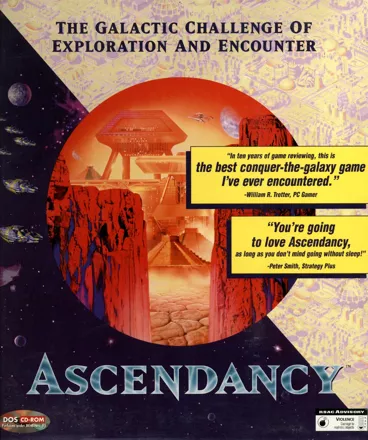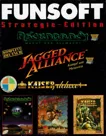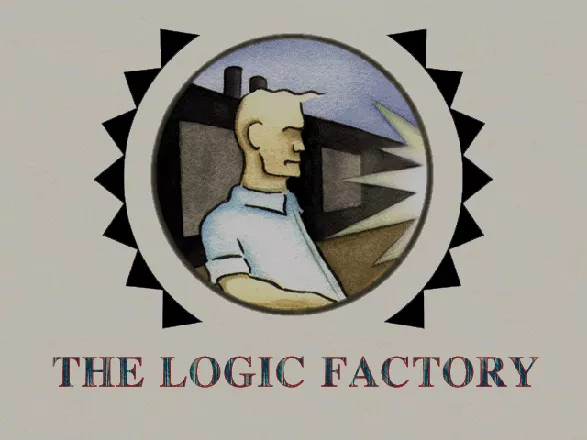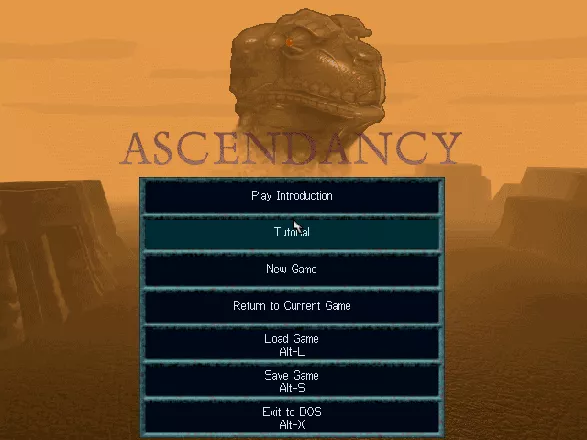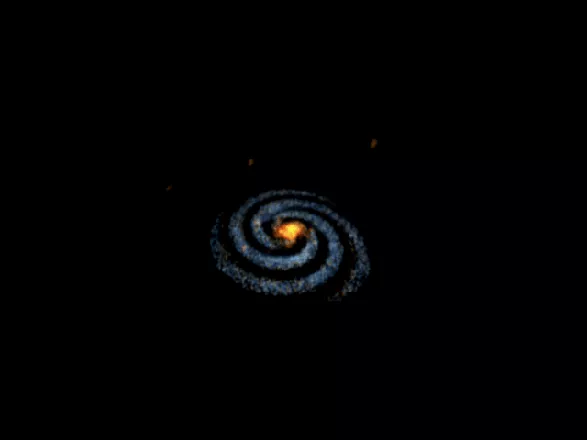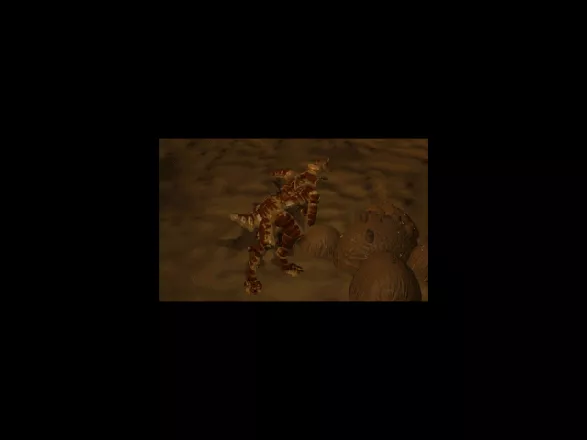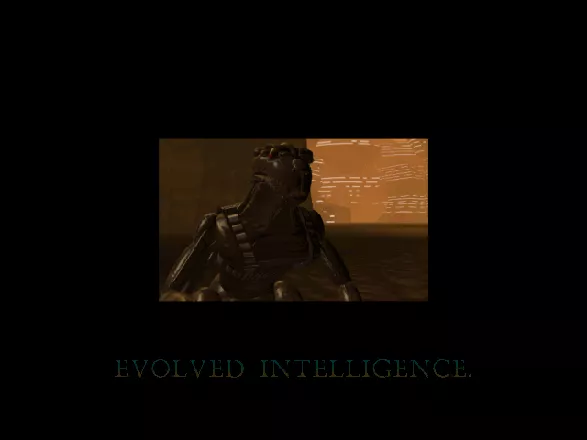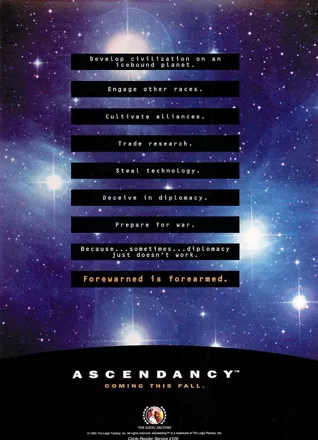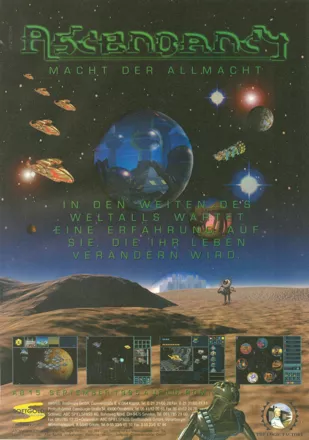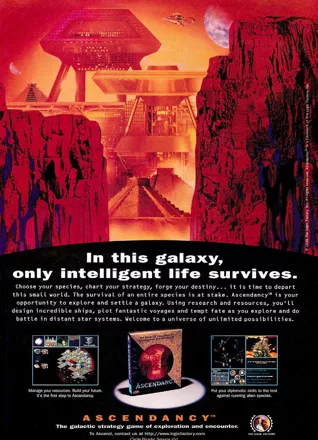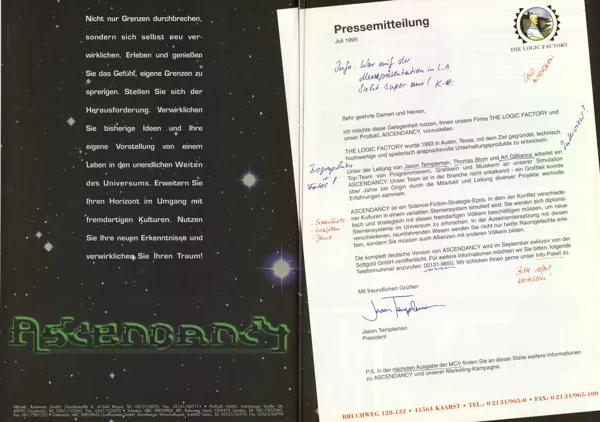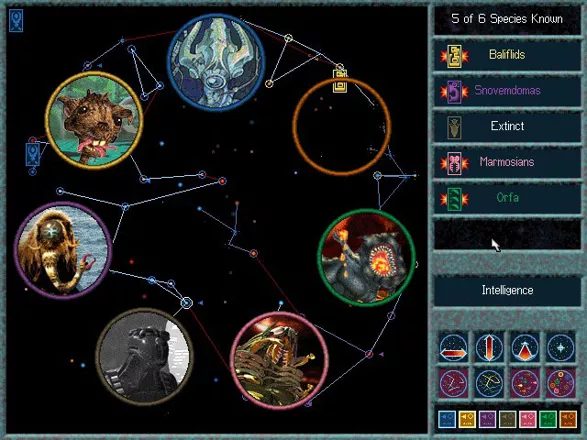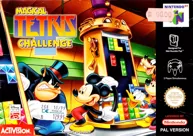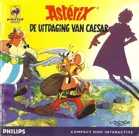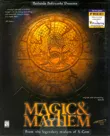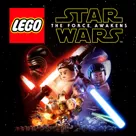Ascendancy
Description official descriptions
Ascendancy is similar to, but nevertheless very different from, Master of Orion. You play one of many races, each with a special ability and special character traits, who set off to explore space, erect colonies (which can each have individual purposes, depending on their raw materials) and engage in battles when you clash with others who have the same goals. Weapons on the ships use power, which has to be supplied somehow.
This game introduces many original concepts, such as the Research Tree - a special scientific display in which discoveries are depicted as icons connected by lines to the "parent" technological breakthroughs and "child" ones, similar to the technology advances in Civilization, but presented in a much more visual way.
Groups +
Screenshots
Promos
Credits (DOS version)
31 People (23 developers, 8 thanks) · View all
| Created by | |
| Made possible through the efforts of | |
| Additional support and content provided by | |
| Packaging and Manual Art Direction and Design by | |
| Packaging Illustration | |
| Manual Digital Enhancement | |
| AIL and VFX libraries by | |
| Special Thanks to the Brøderbund Team | |
| AIL and VFX libraries by |
|
| Design & Artwork Coordinator | |
| Design |
|
| Photography | |
| Package Design Art Direction | |
| [ full credits ] | |
Reviews
Critics
Average score: 78% (based on 15 ratings)
Players
Average score: 3.9 out of 5 (based on 71 ratings with 14 reviews)
Fun at first, but ultimately unsatisfying.
The Good
Graphically beautiful, with a nice tech tree and plenty of interesting structures to build on and around your planets. The galaxy is modeled in three dimensions, which (as far as this reviewer knows) was a first in this genre. There are a lot of races to choose from, and the game itself can be customized extensively, so in theory you could play it forever.
The Bad
Politics and diplomacy are minimal, and ship design and combat are extremely lacking -- basically, the bigger the ship the better, so there aren't really any interesting tradeoffs to make. The three dimensional galaxy helps cover up the weak AI opponent, since the jumpgate system forces you to move through bottlenecks and generally limits you to frontal assaults. The races are many, but they just don't have a whole lot of personality when compared to those in Master of Orion.
The Bottom Line
There are good things about Ascendancy, but too many bad things along with them. I recommend that you resist the temptation to pick up this game, and stick to MOO and MOO2 instead.
DOS · by PCGamer77 (3158) · 2011
The Good
Well, for one, the game itself is magnificent - as addictive as Master of Orion with some original twists. It's not quite as elaborate as MOO but is good never the less; the music is short but very good and so are the graphics. The interface is very well-made (mouse controlled) and the research tree rocks.
The Bad
Hmm... could get boring at times, but that's it.
The Bottom Line
Sort of a Master of Orion made by another company.
DOS · by Tomer Gabel (4538) · 1999
Both better and worse than MOO
The Good
The three dimensions were great. The nature of both the galactic map and the system display were great, and a definite plus over the flat universe of MOO. In addition, Ascendancy systems had the realism of containing multiple planets, although I found that the nature of these planets did not depend on the star type.
The races were, for the most part, quite novel, and my only complaint is that we humans didn't show up.
Weapon balance was, for the most part, very good. Although late-technology weapons were far better than earlier ones (and so they should be!), new advances did not necessarily make older ones obsolete. Nothing, for instance, ever exceeded the range of the plasmatron, a weapon you can get your hands on while still pretty early in the game.
The variety of technologies was, although not spectacular, decent. In contrast to MOO, which mostly offered improvements on a small set of technologies, Ascendancy research provides whole new tools and abilities. I don't think that I have seen any game with as many planetwide projects possible; there were I believe three or four completely different types.
One of the nicest bits was that most aspects of the game were not statistic-based. Battles and advances were decided not on the basis of rolling dies, but depended almost entirely on your actions (of course, there are exceptions; the technology you get from ruins is completely random, and planets are mostly evaluated based on their Three Statistics).
The Bad
The same thing nobody else liked about the game: the computer opponents.
It's a pity that the same effort which went into the rest of the game could not go into the computer code; the algorithms were far too simple, almost as if they had been quickly added to the rest of the game. Diplomatic reactions were far too simple as compared, say, to MOO, and a noticeable bug is that your allies never seem to expect you to honor your alliances.
Combat code, the other foundation of the game, was equally shaky. The enemy ships were clearly following a certain specific set of checks, which I could probably copy out here to high accuracy if it were not against the rules to give out cheats (and knowing how the computer will react to anything is, essentially, the ultimate cheat). Let's just say that I found any number of tricks which pretty much ensured military superiority, even when the enemy had the superior force. One remark I will make is that the game code is very offense-oriented; unlike in MOO where sometimes the other player will seem to "see" what you are trying to do and take evasive action. I have yet to see an Ascendancy ship retreat.
What else? Well, there are a few obvious bugs elsewhere (e.g., in the building code); it seems that they spent almost no time debugging. A tight deadline, perhaps? Another complaint is the complete randomization of the xenoarchaeological code; a race can get a valuable technology (say, large-scale construction or lush growth bombs) early in the game and have a decided advantage over the others.
The Bottom Line
Excellent game at first, and very replayable, but expect to master it quickly.
DOS · by somebody (6) · 2001
Discussion
| Subject | By | Date |
|---|---|---|
| Colonization | vedder (70767) | Feb 21, 2009 |
Trivia
PC Gamer controversy
A minor scandal surrounded the PC Gamer review of Ascendancy. PC Gamer gave the game high marks, and made it an Editor's Choice game. However, the individual who reviewed the game for PC Gamer also turned out to be the author of the game's Strategy Guide, leading many to wonder if the review had been padded in order to boost sales of the Strategy Guide.
In Computer Gaming World #151 (February 1997), a letter by William Trotter was published in which he shared his view on the matter. Summarized, he needed money to pay off repairs on his house and therefore gladly agreed to write the strategy guide. However, the developers failed to give him any information on the game, not even technology trees, and a one-month deadline. So he had no other choice but to play the game non-stop for two weeks, becoming eventually obsessed with it. So when PC Gamer hired him for the review, he really thought Ascendancy was a great game, and he failed to see the conflict of interest. In hindsight, he agrees with the bad review in Computer Gaming World (see MobyRanks), the strategy guide turned out to be pathetic and he didn't receive any royalties from it at all.
Awards
- CODiE Awards
- 1996 - Best Strategy Software
Information also contributed by Afterburner
Analytics
Upgrade to MobyPro to view research rankings!
Related Sites +
-
Ascendancy
official game page at Logic Factory's website, archived copy from 1997 by the Wayback Machine
Identifiers +
Contribute
Are you familiar with this game? Help document and preserve this entry in video game history! If your contribution is approved, you will earn points and be credited as a contributor.
Contributors to this Entry
Game added by Tomer Gabel.
iPad, iPhone added by Techademus.
Additional contributors: Rebound Boy, formercontrib, Patrick Bregger, MrFlibble.
Game added August 29, 1999. Last modified January 23, 2024.
